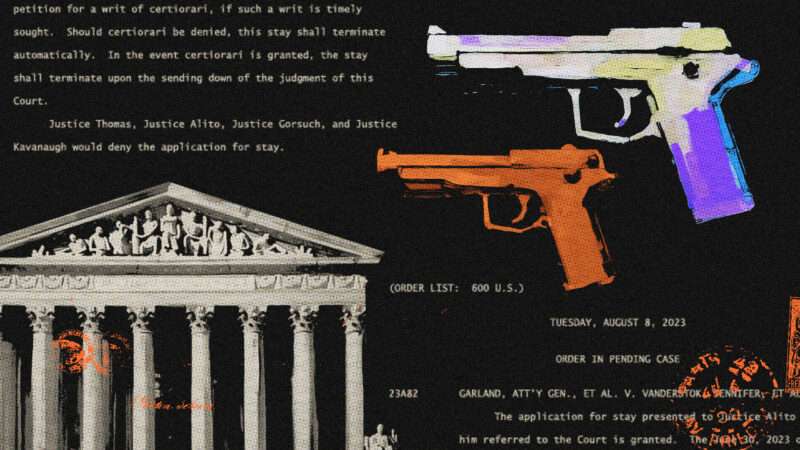
In a July decision in the case of VanDerStok v. Garland, Judge Reed O'Connor of the U.S. District Court for the Northern District of Texas paused the implementation of some Biden administration Bureau of Alcohol, Tobacco, Firearms and Explosives (BATF) regulations on so-called "ghost guns." These kits of non-fireable materials are purchasable online and, with some machining, can be turned into functional homemade guns that would lack any government-ordered serial number and thus be "untraceable."
Yesterday, the Supreme Court, in a one-page order with no analysis, decided that the District Court opinion stopping the enforcement of those anti-"ghost gun" regulations (specifically, "the Final Rule, Definition of 'Frame or Receiver' and Identification of Firearms…codified at 27 C.F.R. pts. 447, 478, and 479 (2022)") is "stayed pending the disposition of the appeal in the United States Court of Appeals for the Fifth Circuit and disposition of a petition for a writ of certiorari, if such a writ is timely sought."
In other words, those BATF regulations do still have legal force. For a small preview of how things might go if this case is considered fully by the Supreme Court after the appeals court does its thing, four justices did not join this order: Samuel Alito, Neil Gorsuch, Brett Kavanaugh, and Clarence Thomas.
The Biden administration believes that "untraceable firearms" represented, as reported by The New York Times, an "urgent public safety and law enforcement crisis."
As the Times explained, the regulations at issue "did not ban the sale or possession of kits and components that can be assembled to make guns…but it did require manufacturers and sellers to obtain licenses, mark their products with serial numbers and conduct background checks" on buyers. Jennifer VanDerStok and those on her legal team think that the Gun Control Act of 1968 and its strictures were not meant to apply to such items and that BATF lacks authority, under current law, to insist that they do.
In their original August 2022 suit, VanDerStok and her team declared that "President Biden has both expressed and advanced his intentions to expand federal firearm regulations regardless of whether Congress concurs, in contravention of the constitutional limits on Executive authority."
Writing on the original District Court decision in VanDerStok at Reason back in July, J.D. Tuccille hit the heart of the Biden-era BATF rules' overreach:
[P]ressured by the Biden administration, the ATF tried to extend firearms regulations to a lot of things that aren't guns but could, with work, become one. Now a federal judge is injecting some sense, ruling in a lawsuit that bureaucrats can't just decide that inert objects are guns.
As Tuccille explained:
For years, through a page still on its website, federal gun regulators assured the public that "ATF has long held that items such as receiver blanks, 'castings' or 'machined bodies' in which the fire-control cavity area is completely solid and un-machined have not reached the 'stage of manufacture' which would result in the classification of a firearm." That's good sense unless you look forward to background checks and government scrutiny every time you visit the hardware store where all sorts of items that could be turned into guns are sold.
Americans, for excellent reasons, have the right to own weapons and a curtailed right (at least as far as the courts are concerned) to carry them. The right to make guns should logically follow quite easily from this. That right should not present particularly difficult or fresh rethinking for the Supreme Court, given current doctrine concerning the Second Amendment.
Jacob Sullum explained at Reason back in March how:
The ATF's about-face in service of Biden's gun control agenda threatened to destroy an industry that catered to DIY gun makers based on the agency's previous interpretation of the law. Tactical Machining, one of the original plaintiffs in this lawsuit, said the agency's edict, which transformed legal businesses into criminal enterprises, would wipe out more than 90 percent of its revenue.
What's at issue in the VanDerStok case is not core Second Amendment rights but rather questions of a regulatory agency's authority to redefine the law. It was that overreach on BATF's part that Judge O'Connor tried to overturn. (Tuccille gave a detailed explanation in April 2022 of how much chaos and confusion in the world of gun parts sales and adjustments is inherent in the poorly written BATF 2022 regulations.)
Whether or not the Courts or the administration recognize or honor either the core right protected by the Second Amendment or the procedural question about whether administration bureaucrats can change laws to suit them when it comes to homemade gun making, the government certainly can't stop the technologies of communication and production that allow "ghost guns" to flourish.
The post Supreme Court Lets Biden's 'Ghost Gun' Regulations Stand Pending Ongoing Lawsuit appeared first on Reason.com.







